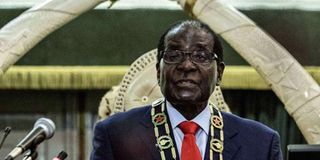Nothing wrong with Africa; we just need to stop being Chinese for a while

Zimbabwe's President Robert Mugabe delivers his State of the Nation address in Parliament in Harare on August 25, 2015. PHOTO | JEKESAI NJIKIZANA |
What you need to know:
- This year feels like 1989 all over, in Africa.
- That year the Berlin Wall came down, representing the end of the bitter post-World War II divide between countries.
This year feels like 1989 all over, in Africa. That year the Berlin Wall came down, representing the end of the bitter post-World War II divide between countries that were socialist/communist (led by the Soviet Union), and those that were capitalist (led by the United States). It also marked the end of the Cold War.
The former also used to be referred collectively as the East, and the latter the West. The Union of Soviet Socialist Republics, USSR, also collapsed and only Russia remained of it.
There were also a couple of non-aligned countries, meaning, like Tanzania, they were in bed both with the East and the West.
Anyway, when the Cold War ended, a couple of African countries were in trouble. Mozambique, Angola and others that were socialists, now no longer had a godfather who used to prop them up since the Soviet Union had collapsed.
But capitalist anti-communist countries like Mobutu Sese Seko’s Zaire (DR Congo today) and Kenya were in trouble too. In the Cold War era, the West backed these leaders, no matter how corrupt or cruel their rule was, in reward for their being anti-Communist.
Now that the Communists were gone, there was no need to pamper them. Before long, Rwanda-backed rebels ran Mobutu out of town. In Kenya, criticism of the Kanu government’s human rights and democracy record mounted. Isolated and softened, Kanu accepted political reforms.
NOWHERE TO GO
The point is that because Africa had hitched its wagon either to the East or West’s donkeys, and when they took away their animals, our wagons had nowhere to go. The lesson we should have learnt is that we needed to buy and raise our own donkeys. We didn’t.
Most African countries surrendered, and went with the winner of the Cold War – the West. Then along came China. A member of the old socialist club, it was the world’s biggest country by population, and growing rich so fast, it was on course to be the world’s leading economy.
There was no African forest, mineral, or oil well China saw that it didn’t want to buy. Also, there was no barren land, Africa bush track, or river it didn’t want to build a railway, road, or bridge on.
Unlike the West, it didn’t demand that African governments observe human rights or stop stealing taxpayers’ money before doing business with them. African leaders loved that.
So we unhitched our wagons from the Western donkey, and hooked it up to China. And, for sure, we grew rich, and people started writing and talking about “Africa rising” and “looking East”.
Then it happened. China’s economy started to slow, and it slowly reduced what it bought from Africa. Then its stock markets tanked, and it devalued the yuan to improve its exports.
Already hammered by low commodity prices, from Nigeria, Kenya, Uganda, South Africa, Tanzania, African currencies tumbled further, and governments slashed growth forecasts.
Part of the problem was that we left it to China’s horse to pull Africa to development nirvana, and as happened in 1989, we have again been left stranded by the roadside with our wagons.
There are many reasons why we have failed to chart our own path. Today we focus on one – what happens to our intellectuals. You need people who can think to help a nation map its development course.
POISONED ENVIRONMENT
However in Africa, two bad things usually happen. When a new promising government comes to power, half the intellectuals join it and they become spoilt.
They then use their skills to denounce or oppress the other half of the intellectuals who stayed out of government. These are ignored, silenced, or often become too shrill in their anti-government posture, and thus unproductive.
The environment becomes so poisoned, no good ideas about how to run an economy or country emerges. So we turn to Beijing, Singapore, London, or Washington, and borrow theirs.
So I imagine many African countries’ economic recovery planners are praying for China to recover.
Meanwhile, in Zimbabwe, Robert Mugabe whose country owes the Chinese over $1.5 billion, and Beijing is demanding its money, finally caved in.
After spending 15 years railing against the West, on Tuesday he threw in the towel and asked them to come help him dig his broken economy out of the deep hole into which he had thrown it.
For all his seven degrees, Mugabe in the end failed to develop a Zimbabwe model that works.
The author is editor of the Mail & Guardian Africa (mgafrica.com). Twitter@cobbo3





